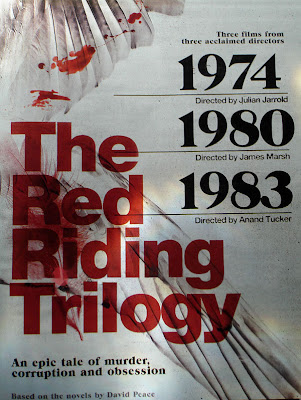Thoughts on The Red Riding Trilogy
 -A crime drama delving into murder, obsession, and corruption, spanning nine years. Stars, among others, Andrew Garfield, Sean Bean, David Morrissey, Patty Considine, and Mark Addy, and consisting of three parts (In the Year of Our Lord 1974/80/83) by three different directors (Julian Jarrold, James Marsh, Anand Tucker).
-A crime drama delving into murder, obsession, and corruption, spanning nine years. Stars, among others, Andrew Garfield, Sean Bean, David Morrissey, Patty Considine, and Mark Addy, and consisting of three parts (In the Year of Our Lord 1974/80/83) by three different directors (Julian Jarrold, James Marsh, Anand Tucker).-The first part, 1974, follows a young reporter (Andrew Garfield) assigned the story of a young girl gone missing, then murdered, thinking he has an editorial on his hands when he uncovers other murders of that nature, but finds himself captive of a layers-deep conspiracy among the Yorkshire police.
-A grim piece, filmed in grainy 16 mm and color-schemed to dullness, even when people wear bright clothes. Nonetheless, Jarrold ruthlessly immerses you in this hopeless, cigarrette-stained 70s world, you can smell the cheap cologne and sweat in a bar, the burnt garbage of a destroyed gypsy camp, the sleazy cleanness (yeah...) of a nice house with lots of secrets.
-Providing the emotion of this film is Rebecca Hall, as the mother of one of the missing girls. Fragile and long past heartbroken, she regards even those she comes to trust with a weary cynicism, though you can see happiness she once must've exuded, making her character all the more tragic.
-Andrew Garfield is fine, great in places, though the only thing I wonder is how he will go to playing a high schooler in the Spider-Man reboot. I've seen this now, and apologetically adult role, and I'll always see him like that now, dammit.
-He does get beaten up a lot.
-The biggest credit to the supporting actors is that they blend into the background, essential to making the lead feel all the more isolated as he goes along. I think.
-A noir at it's finest.
-The second part, 1980, is, I think, the worst, just because it is so clinical and procedural, spending more time in the police station that out investigating. Paddy Considine is amazing here, though.
-The third part, 1983, wraps everything up, a redemption for three characters, two supporting or background for the first parts, one a new one with connection to these.
-The most interesting of these is the young male prostitute (Robert Sheehan)...in the first part, he has a small role, the flamboyant friend of Eddie (Andrew Garfield)'s friend Barry (Anthony Flanagan), who was murdered after already confessing his fears. He gives Eddie 'Barry's life's work', revealing the deep police corruption within the city, before skulking away and making a small, literally out-of-focus appearance in the very end. In the second part, he is noticeably more subdued, the pink streaks in his hair and flashy 70s clothes gone, a slightly mad, more so mournful look in his eye, tipping Paddy Considine's detective Hunter to the possibly police-staged copy-cat murder of his friend, a barmaid and prostitute. Both of his appearances in this one are quiet and revealing and over-the-top elusive. Right.
-The third part (because that paragraph is way too long), he plays one of three roles, narrating the story in rhyme. He now appears completely off his rocker, his (ahem) career as a hustler at a crossroads, and his part in the entire conspiracy finally revealed, going by train to a destination left to be revealed. Going any farther would be a spoiler, so, y'know, there's that. Just thought it was brilliantly staged and acted, his development throughout the almost-ten years of this story.
-In the third act, Mark Addy, playing a two-bit solicitor (layer) John Piggot, who's dad was a police officer named 'The Pig', and Maurice Jobson (David Morrissey), a bit character from the first two, detective shown to have a knowledge of all the shit that went down, and at times, a reluctant participant, now haunted by guilt.
-Um...yes. The ending was really very lovely, I'm glad they gave it some hope.
-Sorry this couldn't be better, but I'm fucking tired.
